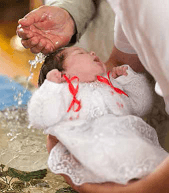 |
||
|
|
|
Events & News Archive
|
Presbyterian Beliefs and Me - Our Polity and Sacraments
Recently, I visited a Presbyterian Church where two elders asked me: "What do you mean by saying that 'Theological unity is no longer realistic?'" My answer was: "What is it that unites us?" It is first the saving work of Christ that unites us and this precedes our understanding of the essential doctrines that define orthodoxy. Why then, for all practical purposes, do we elevate the non-essential to the place of essentials? I believe it is because of immaturity and pride amongst us. Should we not sacrifice our "perfect" opinion on a biblical matter and be gracious to another brother or sister in Christ? Of course we should, but when that doesn't happen, we have denominational splits. As good Presbyterians, it is therefore important for us to know what we believe and why we believe. The three "Cs" of Presbyterianism There are at least three fundamental characteristics by which a system of church government could be called "Presbyterian". These fundamental characteristics are Confessional, Connectional and Constitutional in nature. Grey and Tucker, in the third edition of their book, "Presbyterian Polity for Church Officers", say that ours is a polity of government that is "representative, constitutional, and relational", which, as we will see, is another way of saying, confessional, connectional and constitutional.
Our Sacraments The Reformed tradition understands Baptism and the Lord's Supper to be sacraments instituted by God and commended by Christ. We believe sacraments are God's gracious gifts given by Jesus Christ to the church to establish and nurture our faith. Sacraments are symbolic and are often said to be "visible signs of an invisible grace." They point to a theological reality. Presbyterians believe sacraments are God's ways of reaching out to us in a visible way to convey God's word, just as God reaches out to us through hearing as God's Word is preached and proclaimed. Baptism and the Lord's Supper are signs of God's covenant or special relationship with us. They are also seals of God's covenant with us in Christ. Baptism The Bible teaches that baptism is God's sign of salvation. It was the Lord Jesus Christ who instructed us to baptise believers (Matthew 28:19 – 20). In the Old Testament circumcision was the sign of God's blessing of salvation promised in the covenant made with Abraham (Genesis 17:10 – 11). In the New Testament baptism is the sign of the new covenant and of salvation in Christ (Colossians 2:11 – 12). Unlike some denominations, Presbyterians do not require a person to be entirely immersed in water during baptism. Baptism is received only once. Baptism enacts and seals what the Word proclaims: God's redeeming grace offered to all people. Baptism is God's gift of grace and also God's summon to respond to that grace. Baptism calls to repentance, to faithfulness, and to discipleship. Baptism gives the church its identity and commissions the church for ministry to the world. Infant Baptism
Presbyterians believe that it is appropriate for Christian parents to have their child baptised because of God's covenant with Abraham. The sign of the covenant was given not only to Abraham who believed, but also to Abraham's children. We believe that in the New Testament the promises of the covenant are extended to all true believers and to their children. Baptism does not mean the child immediately becomes a Christian. Although salvation is promised, in time children must trust and believe in Jesus Christ for themselves and enter into confirmation of their faith. When believing parents have their children baptised they are publicly declaring they are committed Christians, and that they want their child to come to know Jesus Christ in a personal way and to grow up to serve Him. Children of believing parents are to be baptized without undue delay, but without undue haste. Infant baptism is given on the basis of the qualifications of the parent, not the qualifications of the child. It is the parents' relationship with God which is important. The baptism of children witnesses to the truth that God's love claims people before they are able to respond in faith. Baptism, therefore, usually occurs during infancy, though a person may be baptized at any age. Parents bring their baby to church, where they publicly declare their desire that he or she be baptized. When an infant or child is baptized the church commits itself to nurture the child in faith. The Lord's Supper
The Lord's Supper is God's gracious gift of a sacrament to nourish our faith. Baptism marks our entrance into the Christian family. The Lord's Supper is our means of being nourished or sustained in our lives as Christ's disciples. The Lord's Supper was instituted by our Lord Jesus (1 Cor.11:23 – 26). It is a sign and seal of God's grace repeatedly given to us, as often as we celebrate it to communicate the benefits of Christ's death to us by faith. The elements in the Lord's Supper, the bread and the wine represent the body and blood of Christ in a symbolic way. They "represent" and they also "present" Christ to us so that by participating in faith, we abide in Christ and Christ in us (John 6:54 – 56). We believe Jesus Christ is present with us in the Supper by faith through the Holy Spirit even though he has ascended into heaven and "sits on the right hand of God Almighty"(Apostles' Creed). We celebrate the Lord's Supper with glad and joyful hearts as we "proclaim the Lord's death until He comes"(1 Cor.11:26). The Lord's Supper may be observed in connection with the visitation of the sick and those who are home bound as a means of extending the church's ministry to them. On such occasions of the celebration of the Sacrament in the home or hospital, the Word shall be read and proclaimed. Even though such a celebration may involve only a few members of the congregation, nevertheless it is not to be understood as a private ceremony or devotional exercise, but as an act of the whole church, which shall be represented not only by the minister or the one authorized by the Presbytery to administer the Sacrament, but also by one or more members of the congregation authorized by the session to represent the church.
|
|
|
Copyright © 2024 The Presbyterian Church in Singapore. All rights reserved. |


